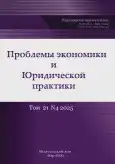Russia's achievements of technological sovereignty: problems and prospects
- Authors: Kapranova L.D.1
-
Affiliations:
- Financial University under the Government of the Russian Federation
- Issue: Vol 21, No 4 (2025)
- Pages: 129-141
- Section: Regional and Sectoral Economics
- URL: https://journal-vniispk.ru/2541-8025/article/view/316461
- DOI: https://doi.org/10.33693/2541-8025-2025-21-4-129-141
- EDN: https://elibrary.ru/BOCFSH
- ID: 316461
Cite item
Abstract
The article examines certain aspects of the implementation of state policy in the field of scientific and technological development as a basis for achieving technological sovereignty. It is revealed that the development of advanced production technologies and the creation of our own technological base for industrial development will allow us to achieve technological sovereignty of the country and achieve technological leadership in the world market. Particular attention is paid to the factors hindering the achievement of technological sovereignty. The mechanism and tools aimed at eliminating or weakening the impact of various factors that hinder the process of achieving technological leadership are studied. The purpose of the work: to study the relationship between the scientific and technological development of Russia and the real sector of the economy. The problems of achieving technological sovereignty of the country are considered from the standpoint of integrating the scientific, technical and industrial spheres of the Russian economy. Attention is focused on the indicators of the achieved level of technological sovereignty by types of products and the level of development of advanced technologies. The need for a systematic approach aimed at the sustainability of industrial development in the future is substantiated. Systemic limitations on the path to technological sovereignty are noted, including import dependence, low commercialization of scientific developments and insufficient development of regulatory and incentive mechanisms and measures. The theoretical basis of the scientific work was the use of general scientific methods of cognition to the processes and phenomena under study. The use of a logical approach made it possible to interpret the results obtained during the study, as well as to draw conclusions and formulate proposals for creating a mechanism for interaction between scientific, technical and industrial spheres on the path to technological sovereignty. It is concluded that despite the current problems, Russia has the resources and capabilities to achieve technological sovereignty and create a modern industry that meets the development goals of the country set in the Strategy for Scientific and Technological Development of the Russian Federation.
Full Text
##article.viewOnOriginalSite##About the authors
Lyudmila D. Kapranova
Financial University under the Government of the Russian Federation
Author for correspondence.
Email: LKapranova@fa.ru
ORCID iD: 0000-0001-9130-1252
SPIN-code: 1874-9887
Cand. Sci. (Econ.), Associate Professor of the Department of Corporate Finance and Corporate Governance, Leading Researcher at the Institute of Financial and Industrial Policy
Russian Federation, MoscowReferences
- Afanasyev A. A. Technological sovereignty: essence, goals and mechanism of achievement. Issues of Innovation Economics. 2025. Vol. 15. No. 2. Pp. 469–488. (In Rus.) doi: 10.18334/vinec.15.2.122986. EDN: FJXXBM. URL: https://1economic.ru/lib/122986.
- Dorzhieva V.V. Development institutions: new priorities and contribution to ensuring import substitution and technological sovereignty in the pharmaceutical industry. Issues of Innovation Economics. 2024. Vol. 14, No. 3. Pp. 789–800. (In Rus.) URL: https://1economic.ru/lib/121443.
- Kopteva L.A., Igishev A.V., Sbitnev N.A. Ensuring technological sovereignty of the Russian Federation: realities and new opportunities. STAGE: Economic Theory, Analysis, Practice. 2024. No. 5. Pp. 26–46. (In Rus.) doi: 10.24412/2071-6435-2024-5-26–46. URL: https://cyberleninka.ru/article/n/obespechenie-spechenie-tehnologicheskogo-suvereniteta-rossiyskoy-federatsii-realii-i-novye-vozmozhnosti/viewer.
- Savchenko E.E. Regional aspect of technological sovereignty—priority vectors of development. Economy, Entrepreneurship and Law. 2024. Vol. 14. No. 9. Pp. 5105–5120. (In Rus.) URL: https://1economic.ru/lib/121551.
- Chernousov D.A. Technological sovereignty as a strategic priority for Russia's development: analysis and prospects. Issues of Innovation Economics. 2025. Vol. 15. No. 1. P. 39–56. (In Rus.) doi: 10.18334/vinec.15.1.12256/ URL: https://1economic.ru/lib/122564 4.
- Chernysheva T.K. Certain aspects of the implementation of state policy in the field of scientific and technological development as the basis for achieving technological sovereignty of the Russian Federation. Audit Statements. 2025. No. 1. Pp. 243–248. (In Rus.) doi: 10.24412/1727-8058-2025-1-243-248. EDN: CDCAQX.
- Bakhtizin A.R. Forecasting issues in modern conditions. Economic Revival of Russia. 2023. No. 2 (76). Pp. 53–62. (In Rus.) URL: https://cyberleninka.ru/article/n/voprosy-prognozirovaniya-v-sovremennyh-usloviyah/viewer.
- Zelentsova L.S., Ukolov V.F., Tikhonov A.I. Development of intellectualization of Russian industry: a strategic approach. Management. 2023. No. 11 (4). Pp. 17–24. doi: 10.26425/2309-3633-2023-11-4-17-24. URL: https://upravlenie.guu.ru/jour/article/view/665/414.
- Korovkin V.V., Kuznetsova G.V. Prospects for the digital transformation of Russian mechanical engineering. Administrative Management. 2020. No. 12 (2). Pp. 291–313. (In Rus.) doi: 10.17072/2218-9173-2020-2-291-313.
- Lepesh G.V. Digital transformation of the industrial sector of the economy. Technical and Technological Problems of Service. 2022. No. 2 (60). Pp. 2–15. (In Rus.) URL: https://file:///C:/Users/Lyudmila/Downloads/tsifrovaya-transformatsiya-promyshlennogo-sektora-ekonomiki.pdf.
- Polozhikhina M.A. Regulation of the process of digitalization of the economy: European and Russian experience. Russia and the Modern World. 2018. No. 4 (101). Pp. 64–81. (In Rus.) URL: https://cyberleninka.ru/article/n/regulirovanie-protsessa-tsifrovizatsii-ekonomiki-evropeyskiy-i-rossiyskiy-opyt/viewer.
Supplementary files
















